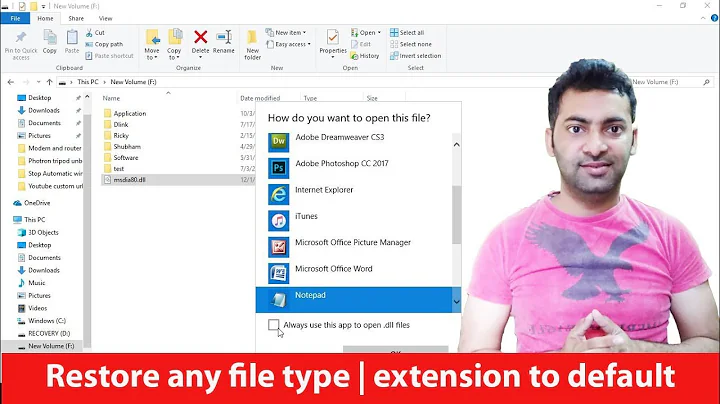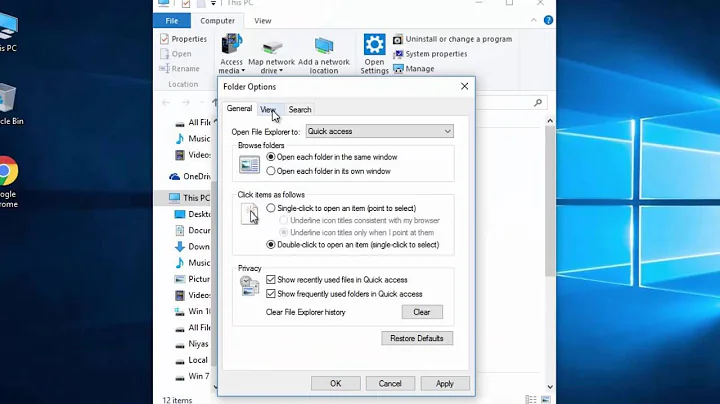How to open every file in a folder
Solution 1
Os
You can list all files in the current directory using os.listdir:
import os
for filename in os.listdir(os.getcwd()):
with open(os.path.join(os.getcwd(), filename), 'r') as f: # open in readonly mode
# do your stuff
Glob
Or you can list only some files, depending on the file pattern using the glob module:
import os, glob
for filename in glob.glob('*.txt'):
with open(os.path.join(os.getcwd(), filename), 'r') as f: # open in readonly mode
# do your stuff
It doesn't have to be the current directory you can list them in any path you want:
import os, glob
path = '/some/path/to/file'
for filename in glob.glob(os.path.join(path, '*.txt')):
with open(os.path.join(os.getcwd(), filename), 'r') as f: # open in readonly mode
# do your stuff
Pipe
Or you can even use the pipe as you specified using fileinput
import fileinput
for line in fileinput.input():
# do your stuff
And you can then use it with piping:
ls -1 | python parse.py
Solution 2
You should try using os.walk.
import os
yourpath = 'path'
for root, dirs, files in os.walk(yourpath, topdown=False):
for name in files:
print(os.path.join(root, name))
stuff
for name in dirs:
print(os.path.join(root, name))
stuff
Solution 3
I was looking for this answer:
import os,glob
folder_path = '/some/path/to/file'
for filename in glob.glob(os.path.join(folder_path, '*.htm')):
with open(filename, 'r') as f:
text = f.read()
print (filename)
print (len(text))
you can choose as well '*.txt' or other ends of your filename
Solution 4
You can actually just use os module to do both:
- list all files in a folder
- sort files by file type, file name etc.
Here's a simple example:
import os #os module imported here
location = os.getcwd() # get present working directory location here
counter = 0 #keep a count of all files found
csvfiles = [] #list to store all csv files found at location
filebeginwithhello = [] # list to keep all files that begin with 'hello'
otherfiles = [] #list to keep any other file that do not match the criteria
for file in os.listdir(location):
try:
if file.endswith(".csv"):
print "csv file found:\t", file
csvfiles.append(str(file))
counter = counter+1
elif file.startswith("hello") and file.endswith(".csv"): #because some files may start with hello and also be a csv file
print "csv file found:\t", file
csvfiles.append(str(file))
counter = counter+1
elif file.startswith("hello"):
print "hello files found: \t", file
filebeginwithhello.append(file)
counter = counter+1
else:
otherfiles.append(file)
counter = counter+1
except Exception as e:
raise e
print "No files found here!"
print "Total files found:\t", counter
Now you have not only listed all the files in a folder but also have them (optionally) sorted by starting name, file type and others. Just now iterate over each list and do your stuff.
Solution 5
import pyautogui
import keyboard
import time
import os
import pyperclip
os.chdir("target directory")
# get the current directory
cwd=os.getcwd()
files=[]
for i in os.walk(cwd):
for j in i[2]:
files.append(os.path.abspath(j))
os.startfile("C:\Program Files (x86)\Adobe\Acrobat 11.0\Acrobat\Acrobat.exe")
time.sleep(1)
for i in files:
print(i)
pyperclip.copy(i)
keyboard.press('ctrl')
keyboard.press_and_release('o')
keyboard.release('ctrl')
time.sleep(1)
keyboard.press('ctrl')
keyboard.press_and_release('v')
keyboard.release('ctrl')
time.sleep(1)
keyboard.press_and_release('enter')
keyboard.press('ctrl')
keyboard.press_and_release('p')
keyboard.release('ctrl')
keyboard.press_and_release('enter')
time.sleep(3)
keyboard.press('ctrl')
keyboard.press_and_release('w')
keyboard.release('ctrl')
pyperclip.copy('')
Related videos on Youtube
B.Mr.W.
SOreadytohelp I am a business data analyst who use R and Python. Started recently learning Apache Spark. I am a firm believer of open source software.
Updated on July 08, 2022Comments
-
 B.Mr.W. almost 2 years
B.Mr.W. almost 2 yearsI have a python script parse.py, which in the script open a file, say file1, and then do something maybe print out the total number of characters.
filename = 'file1' f = open(filename, 'r') content = f.read() print filename, len(content)Right now, I am using stdout to direct the result to my output file - output
python parse.py >> outputHowever, I don't want to do this file by file manually, is there a way to take care of every single file automatically? Like
ls | awk '{print}' | python parse.py >> outputThen the problem is how could I read the file name from standardin? or there are already some built-in functions to do the ls and those kind of work easily?
Thanks!
-
 Charlie Parker almost 8 yearsdoes this handle the file opening and closing automatically too? I'm surprised ur not using
Charlie Parker almost 8 yearsdoes this handle the file opening and closing automatically too? I'm surprised ur not usingwith ... as ...:statements. Could you clarify? -
David R almost 8 yearsCharlie, glob.glob and os.listdir return the filenames. You would then open those one by one within the loop.
-
RockwellS almost 6 yearsThis opens, prints, closes every PDF in a directory using PyPerClip and PyAutoGui. Hope others find this helpful.
-
Khan about 5 yearsthis is the answer because you are reading all files in a directory ;D







